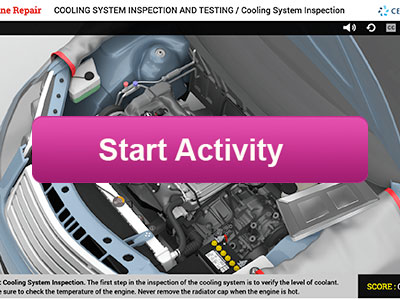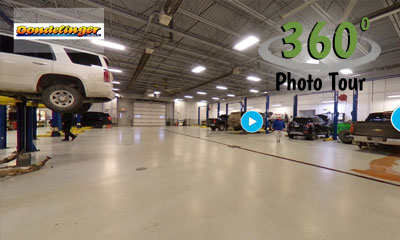It may be tempting to tinker with your car on your own when it breaks down, but for most people, the only solution is to bring it in to an automotive service technician or mechanic. These technicians troubleshoot automobile problems. They inspect vehicles like a detective seeking clues… and replace old parts with the precision of a surgeon. While they use computers to diagnose some issues… inspecting parts and systems as they run through a long checklist…is typical. Mechanics also have a knack for translating car jargon for car owners who need advice on repair decisions. Service technicians work with a variety of tools and grease-covered auto parts… sometimes in uncomfortable positions. Standing all day, lifting heavy objects…. work for mechanics is physically demanding; they must take steps to prevent injuries. Mechanics work in car dealerships, auto repair shops, or may opt for self-employment. It is common for them to work on weekends, holidays, and to put in overtime. Employers prefer to hire technicians who have completed a vocational or post-secondary education program in automotive service technology, and they may also want you to earn industry certification later. It’s just the first step to a career where you can let your passion… drive you.
Related Careers: Motor Vehicles Electronic Equipment Installers and Repairers, Electrical Motor and Power Tool Repairs, Billing and Posting Clerks, Automotive and Watercraft Service Attendants & Purchasing Agents
Sources: Minnesota CAREERwise & CareerOneStop
Typical Work Tasks
People who work in this career often:
- Read work orders or descriptions of problems to determine repairs or modifications needed.
- Operate transportation equipment to demonstrate function or malfunction.
- Rebuild parts or components.
- Repair non-engine automotive or vehicle components.
- Repair worn, damaged, or defective mechanical parts.
- Replace worn, damaged, or defective mechanical parts.
- Service heating, ventilation or air-conditioning (HVAC) systems or components.
- Service vehicles to maintain functionality.
- Adjust equipment to ensure optimal performance.
- Adjust vehicle components according to specifications.
Typical Working Conditions
- Exposure to contaminants (like gases or odors).
- Using your hands to handle, control, or feel objects, tools, or controls.
- Working in a closed vehicle or equipment.
- Frequent decision-making.
- Exposure to hazardous conditions.
- Meeting strict deadlines.
- The importance of being accurate or exact.
- Having face-to-face discussions.
- Wearing common protective or safety equipment such as safety shoes, glasses, gloves, hearing protection, hard hats, or life jackets.
- Working with a group or team.
Tools & Technology used by Automotive Technicians
Source: Minnesota CAREERwise
Most Important Skills for Automotive Technicians
- Maintaining Equipment—Performing routine maintenance on equipment and determining when and what kind of maintenance is needed.
- Repairing—Repairing machines or systems using the needed tools.
- Troubleshooting—Determining causes of operating errors and deciding what to do about it.
- Monitoring Equipment—Watching gauges, dials, or other indicators to make sure a machine is working properly.
- Controlling Quality—Conducting tests and inspections of products, services, or processes to evaluate quality or performance.
- Operating Equipment—Controlling operations of equipment or systems.
- Thinking Critically—Using logic and reasoning to identify the strengths and weaknesses of alternative solutions, conclusions or approaches to problems.
- Listening—Giving full attention to what other people are saying, taking time to understand the points being made, asking questions as appropriate, and not interrupting at inappropriate times.
- Solving Complex Problems—Identifying complex problems and reviewing related information to develop and evaluate options and implement solutions.
- Choosing Equipment or Tools—Determining the kind of tools and equipment needed to do a job.
Most Important Knowledge Areas for Automotive Technicians
- Mechanical—Knowledge of machines and tools, including their designs, uses, repair, and maintenance.
- Computers and Electronics—Knowledge of circuit boards, processors, chips, electronic equipment, and computer hardware and software, including applications and programming.
- Engineering and Technology—Knowledge of the practical application of engineering science and technology. This includes applying principles, techniques, procedures, and equipment to the design and production of various goods and services.
- Customer and Personal Service—Knowledge of principles and processes for providing customer and personal services. This includes customer needs assessment, meeting quality standards for services, and evaluation of customer satisfaction.
- Chemistry—Knowledge of the chemical composition, structure, and properties of substances and of the chemical processes and transformations that they undergo. This includes uses of chemicals and their interactions, danger signs, production techniques, and disposal m
- English Language—Knowledge of the structure and content of the English language including the meaning and spelling of words, rules of composition, and grammar.
- Administration and Management—Knowledge of business and management principles involved in strategic planning, resource allocation, human resources modeling, leadership technique, production methods, and coordination of people and resources.
- Physics—Knowledge and prediction of physical principles, laws, their interrelationships, and applications to understanding fluid, material, and atmospheric dynamics, and mechanical, electrical, atomic and sub- atomic structures and processes.
- Education and Training—Knowledge of principles and methods for curriculum and training design, teaching and instruction for individuals and groups, and the measurement of training effects.
- Mathematics—Knowledge of arithmetic, algebra, geometry, calculus, statistics, and their applications.
Interests
Different careers may be a good fit for your personality or interests. This career is:
- Realistic—Realistic occupations frequently involve work activities that include practical, hands-on problems and solutions. They often deal with plants, animals, and real-world materials like wood, tools, and machinery. Many of the occupations require working outside, and do not involve a lot of paperwork or working closely with others.
- Investigative—Investigative occupations frequently involve working with ideas, and require an extensive amount of thinking. These occupations can involve searching for facts and figuring out problems mentally.
Source: Minnesota CAREERwise
| Wages Per Hour For Automotive Techs (MN) | ||
Low$18.86 |
Median$24.40 |
High$30.42 |
Low indicates 25% of workers earn less and 75% earn more. Median indicates 50% of workers earn less and 50% earn more. High indicates 75% of workers earn less and 25% earn more.
Demand
This career is seeing flat compared to other careers. There will be a 2% growth need for Automotive Technicians to meet market demand between 2018-2028. This includes the demand due to replacement (workers leaving the occupation or retiring) as well as growth.
Source: Minnesota CAREERwise
This career is best for those with at least a high school degree, but most professionals attend some college. This job does not require a license, but certifications could aid in showcasing knowledge.
Visit the Minnesota State Transportation Center of Excellence for more information about this career, as well as links to education and training programs in Minnesota.
View the local post-secondary education options for this career from Central Lakes College.
 Spotlight on Central Lakes College
Spotlight on Central Lakes College
- Why consider CLC?
- Virtual Campus Tours: Brainerd Campus, Staples Campus
- Learn more about the CLC Honors Program.
- Attend CLC, and you may never need to buy a textbook.
If you have a physical, mental, developmental, or cognitive condition that requires educational support, learn about support options at CLC.
Helpful High School Courses
Examples of helpful classes that help you prepare for this career:
- Accounting
- Algebra I and II
- Automobile and Diesel Mechanics
- Business English
- Chemistry
- Industrial Technology
- Manufacturing System
- Metalworking
- Physics
- Pre-Calculus
- Transportation Technology
- Trigonometry
Source: Minnesota CAREERwise


Walk through an engine cooling system inspection through this simulation by Cengage Learning.

Explore this 360 degree view of Dondlinger‘s automotive shop.

Industry Partner

Visit the Minnesota State Transportation Center of Excellence for more information about this career, as well as links to education and training programs in Minnesota.
Video Tour
at Luther Honda (MN State Transportation Center of Excellence)
Videos
Automotive Technology (MN State Transportation Center of Excellence)
Electric Vehicle Technician (Connected Ed)
Automotive Service Tech and Mechanics (CareerOneStop)
Automotive Service Tech (CareerOneStop)
Automotive Mechanic Degree Options (Learn.org)
Automotive Technology Playlist (MN State Transportation Center of Excellence)
Working Techs Talk Playlist (TechForce Foundation)
“Day in the Life” Videos
Vehicle Technician (Connected Ed)
Automotive Technology (US Careers Online)
Learning Videos (TechForce Foundation)
